EAEU trade deal shows resolve to resist protectionism: PM Lee Hsien Loong

Prime Minister Lee Hsien Loong; Armenia Prome Minister Nikol Pashinyan; and Eurasian Economic Commission Board Chairman Tigran Sargsyan, attend a joint press conference at the Governmental Residence in Yerevan, Armenia, on Oct 1, 2019.
YEREVAN, ARMENIA – A new free trade agreement signed between Singapore and the Eurasian Economic Union (EAEU) will deepen ties, and catalyse greater trade and investments between the two sides, Prime Minister Lee Hsien Loong said on Tuesday (Oct 1).
But the FTA is also “significant because it shows our resolve to resist the tide of protectionism”.
Mr Lee said he was glad Singapore has found in the members of the EAEU – comprising Armenia, Belarus, Kazakhstan, Kyrgyzstan and Russia – “like-minded partners committed to multilateralism and free trade”.
“We are convinced that free trade will foster competition and innovation, allow our businesses access to new technologies and global networks, increase our productivity and grow our economies.”
PM Lee was speaking at a joint press conference with Armenian Prime Minister Nikol Pashinyan and Eurasian Economic Commission chairman Tigran Sargsyan, following the signing of two deals under the EAEU-Singapore FTA.
The Framework and Non-Services and Investment Agreements were inked at the Governmental Residence in Yerevan, Armenia, at the session of the Supreme Eurasian Economic Council, a meeting of the EAEU leaders
PM Lee, who witnessed the signing, was in New York last week to attend the United Nations General Assembly. He noted on Tuesday that many leaders there, particularly of small states, had expressed concern “at the instinct to turn inwards, harden borders and hinder the free flow of trade and commerce”.
Mr Lee said he hopes the FTA will lead to a broader trade agreement between the EAEU and Asean.
“We have 800 million people between us, so it would be a substantial FTA. Such an FTA will help us unlock many more opportunities and realise our full potential,” said the Prime Minister.
On the benefits of the FTA, he noted trade between EAEU and Singapore now stands at US$6.5 billion (S$9 billion), which is “not insignificant, but still quite modest”.
When the FTA comes into force, Singapore companies can enjoy lower tariffs and non-tariff barriers, he added.
“These are tangible benefits that can immediately and meaningfully boost our trade. In the longer term, regulatory cooperation, enhanced business linkages and greater familiarity with each other will enable our companies to operate across our regions with more ease and efficiency,” he said.
After the press conference, Singapore and Armenia signed the bilateral Services and Investment Agreement, which is part of the EAEU-Singapore FTA.
PM Lee said he was looking forward to a swift conclusion of the remaining agreements with other EAEU members.
Discussing the approach to negotiating FTAs with other countries, he said in an interview with Singapore media that the Republic is at a “disadvantage” because it is small, its economy is open, and tariffs are nearly zero.
“Therefore, people say what is the point of negotiating an FTA with Singapore. So our answer to them has been, because there are other non-tariff aspects which we can work together on and liberalise, particularly in the services sector like financial services.
“Also, if you have an FTA with Singapore, that is a pathfinder which encourages other countries also to enter into FTAs with you,” he added, citing trade deals Singapore has with countries such as China, New Zealand, Japan and Australia.
Mr Sargsyan said the EAEU-Singapore FTA is a good example of how the union can structure trade deals with other countries.
He also said the union has received an application from Israel to initiate negotiations for a comprehensive agreement covering goods, and services and investment.
“We hope to continue this practice further,” he added.